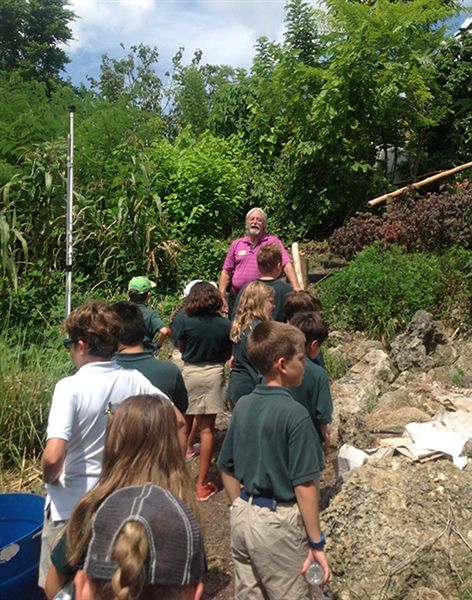

Ecology and ECHO Global Farm
Source/Author: Dr. Lisa Bianco, Head of Lower School
September 30, 2016
From kindergarten through fourth grade, Lower School students study environmental science and explore concepts of conservation and sustainability within the curriculum:
- Kindergarten - living and nonliving things, gardening and “Healthy Me” investigations
- First grade - Ocean Ecosystems
- Second grade - The Life Cycle of Plants and gardening
- Third grade - Florida’s Ecosystem
- Fourth grade - Sustainability and Composting
Students in fourth grade spent two days last week collecting food after lunch that was going to be thrown out as part of their compost project. They also gathered all the garbage from the lunch bins, spread the waste out on tarps and studied what Lower School as a community threw away. They weighed the garbage as part of their research. They were very pleased to discover that their efforts to teach our school community about recycling are working. Very few plastic bottles were placed in the garbage (which means they went in the recycling bins.)
They noticed, however, that Lower School students are using a lot of styrofoam trays each day, which are unfriendly to the environment. The students are wondering how they might be able to change the way lunch is served in the Lower School. They thought that paper trays would be a better choice. They also shared that they want, “to encourage all students and adults to bring water from home in a reusable thermos and to stop buying plastic water bottles.”
Fourth grade students also toured the ECHO Global Farm in Ft. Myers to investigate topics relating to hunger and sustainability. They learned how people living in different parts of the world can farm to become more self-sufficient. World Hunger may seem like a mature topic for the average 9 or 10 year old, but they got a sense of how some people are trying to solve this problem.
They noticed, however, that Lower School students are using a lot of styrofoam trays each day, which are unfriendly to the environment. The students are wondering how they might be able to change the way lunch is served in the Lower School. They thought that paper trays would be a better choice. They also shared that they want, “to encourage all students and adults to bring water from home in a reusable thermos and to stop buying plastic water bottles.”
Fourth grade students also toured the ECHO Global Farm in Ft. Myers to investigate topics relating to hunger and sustainability. They learned how people living in different parts of the world can farm to become more self-sufficient. World Hunger may seem like a mature topic for the average 9 or 10 year old, but they got a sense of how some people are trying to solve this problem.
Fourth graders were exposed to a working "farm science lab" as it was described by a docent. These scientists practice growing crops as if they were in a laboratory so that they can help poor areas around the world yield the most food for their people. They also witnessed the savvy use of animals to fertilize and tend the areas to be farmed.
























